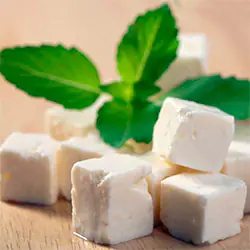Feta (translated from Greek: hunk, piece) is a famous representative of Greek culture, who has received worldwide recognition, along with mythology and ancient philosophers. This is a unique white sheep's cheese. Although there are also alternative options, for example, from goat’s milk.
Feta cheese is young cottage cheese, tightly compressed and has a not quite cottage cheese taste. It contains saltier and more sour notes than cottage cheese. It is also characterized by a high proportion of fat – at least 45-50%. Despite such impressive fat content, many bodybuilders willingly include it in their diet, at least in the off-season. Well, when working on relief and during a period of tough struggle with subcutaneous fat, bodybuilders still prefer to give it up.
The process of preparing this product is not particularly complicated. Sheep milk is heated until it coagulates. After which the whey is drained, and the curd mass itself is transferred to fabric bags and hung on hooks. After a few days, the resulting product can be said to be ready. Next, it is taken out of the bags, rolled in salt and left to ripen for three months in a dry place. The cheese is stored in brine made from olive oil or whey. This allows you to keep it usable for several months, and if it is too salty, you can place it in milk for a few minutes to soak.
Feta producers are scattered throughout Europe. They can be found in Romania, Bulgaria, Croatia or Israel. But as stated earlier, this product means a lot to Greek culture. Therefore, the European Union has officially banned the use of the term “Feta” in the names of its food products not produced in Greece. An official document was even published. However, this does not prevent manufacturers from producing virtually similar products according to the same recipe, and even using ordinary cow’s milk in the preparation process. But in fact, they are not breaking the law by doing so, since such a similar product appears on retail shelves: Fetaki, made entirely and not in Greece.
There are three types of feta:
- from sheep's milk,
- from cow's milk while maintaining the classic recipe,
- made in a different way.
Feta is very healthy, as it contains a large number of bacteria that are useful for normalizing the functioning of the digestive tract. Constant consumption of this cheese eliminates stomach upsets, maintaining the correct balance of microorganisms. This beneficial effect of the product is associated with the Greeks’ use of unpasteurized milk, which preserves all the bacteria so necessary for the human body.
Cooking is impossible without Feta famous Greek salad. I don’t think anyone needs to explain what this dish is - at least once in our lives, each of us has tried this famous, amazing salad. Greek cheese perfectly adds a piquant flavor to all the remaining ingredients: cucumbers, tomatoes, oregano, basil, red onions, olives, bell peppers and olive oil. If you haven't tried it yet, we highly recommend doing so. The salad is finger licking good!
Post Views: 81


